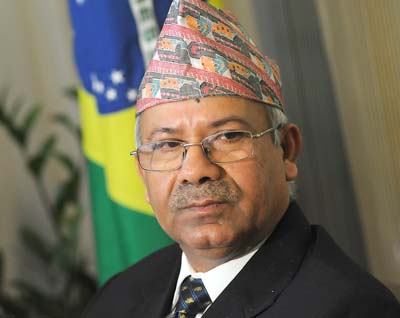Nepal PM begins China visit
 Kathmandu, Dec 26 - Accompanied by three ministers, Nepal's Prime Minister Madhav Kumar Nepal Saturday left for his first official visit to China, pledging it would create a new high in economic ties.
Kathmandu, Dec 26 - Accompanied by three ministers, Nepal's Prime Minister Madhav Kumar Nepal Saturday left for his first official visit to China, pledging it would create a new high in economic ties.
During the five-day trip, Nepal will meet Chinese President Hu Jintao, his Chinese counterpart Wen Jiabao and senior officials of the Communist Party of China.
He will also speak on Sino-Nepali relations at Tsinghua University and tour Lhasa, Xian and Shanghai cities.
Nepal is accompanied by Deputy Prime Minister and Foreign Minister Sujata Koirala, Finance Minister Surendra Pandey and Energy Minister Prakash Sharan Mahat.
Before his departure, Nepal told journalists at the Tribhuvan International Airport in Kathmandu that the goodwill visit is expected to create a new high in economic cooperation and push technical cooperation.
Agreements for economic cooperation to the tune of 15 billion yuan ($2.2 billion) is expected to be signed while Nepal will urge Beijing to help build a hydropower project and a highway.
Before his departure, the premier also met representatives of the 25 parties in parliament to brief them about the visit.
Pashupati Shumsher Jung Bahadur Rana, leader of the Rastriya Prajatantra Party, said after the meeting that Nepal would be pledging the republic's commitment to the "One China" policy that regards Tibet and Taiwan to be integral part of the Communist republic.
"Nepal's soil will never be allowed to be used for anti-China activities," Rana said.
The parties, in turn, have urged the prime minister to seek the help of China, the current chair of the UN Security Council, to help in the country's ongoing peace process.
The underlying political and diplomatic reason behind the visit seems to be to indicate to Beijing - and the world - that the feud between the ruling parties and the Maoists, who began new protests from Christmas Day, is nearing reconciliation and the new constitution would be enforced as per schedule by May.
It is also intended to demonstrate to the Maoists the ruling parties' proximity to Beijing.
Nepal's predecessor, former Maoist prime minister Pushpa Kamal Dahal Prachanda, created a controversy last year when he chose to visit Beijing first instead of New Delhi, that used to be the first destination abroad for Nepal's premiers.
Prachanda later said the move angered India.
After quitting the prime ministerial post, Prachanda again visited China in October this year.
Nepal left the country at a time there is increasing political turmoil, insecurity and a series of crises.
The Maoists have given the government a month's time to meet their demands or face an indefinite general strike from Jan 24.
The coalition government is facing a power and fuel crisis and there is increasing violence in the Terai plains in the south, along the India-Nepal border.
The China visit is being watched closely by the Maoists, who have dismissed Nepal's visit to India earlier this year as a failure. (IANS)